专题八动词的时态和语态-2023年初中英语中考复习专项突破(含解析)
文档属性
| 名称 | 专题八动词的时态和语态-2023年初中英语中考复习专项突破(含解析) |
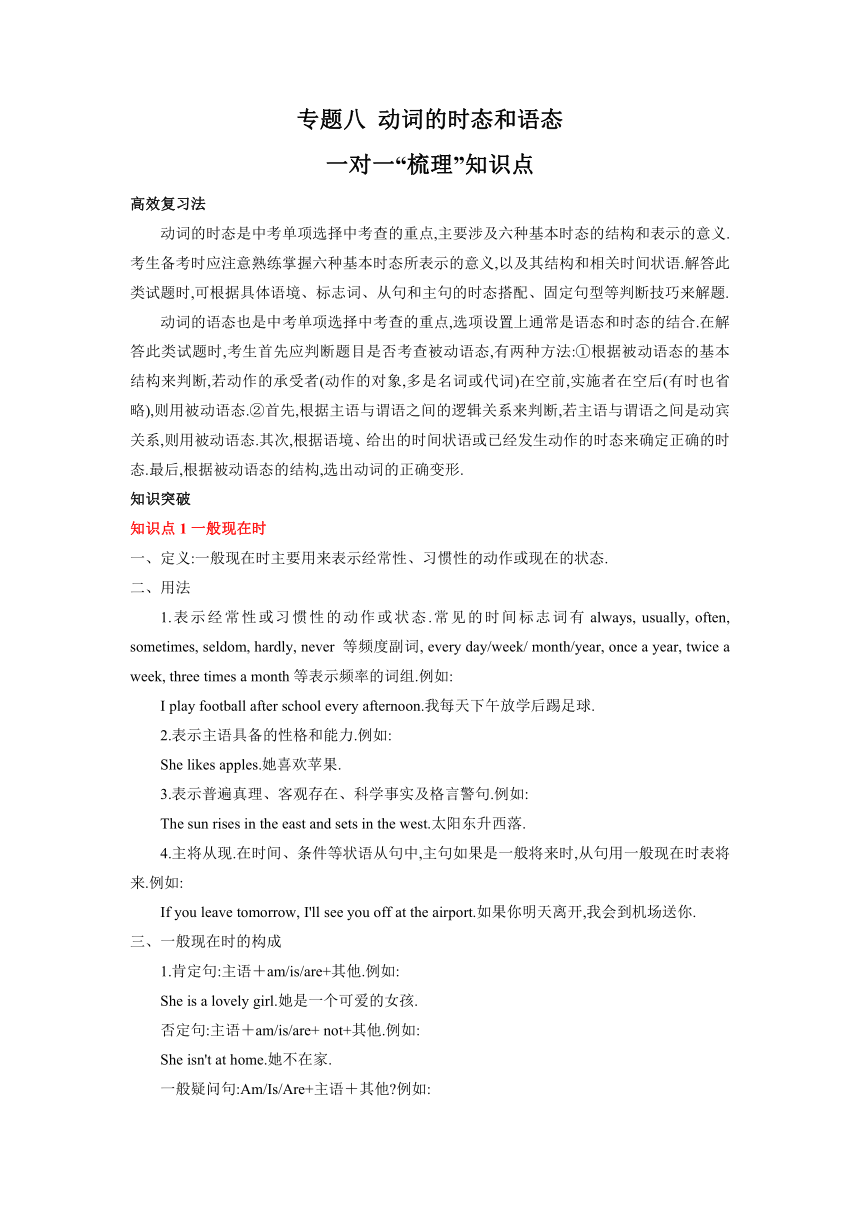
|
|
| 格式 | docx | ||
| 文件大小 | 130.1KB | ||
| 资源类型 | 教案 | ||
| 版本资源 | 通用版 | ||
| 科目 | 英语 | ||
| 更新时间 | 2023-03-08 15:13:31 | ||
图片预览

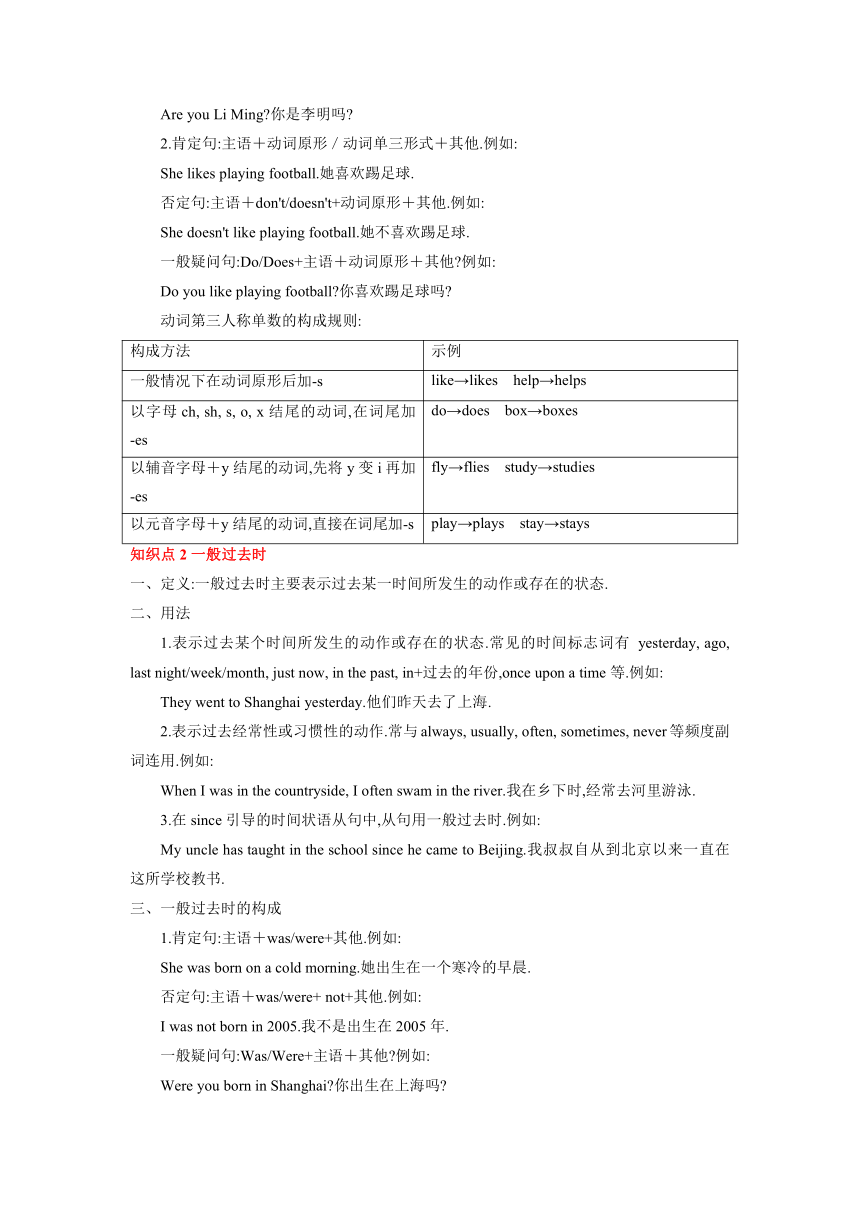
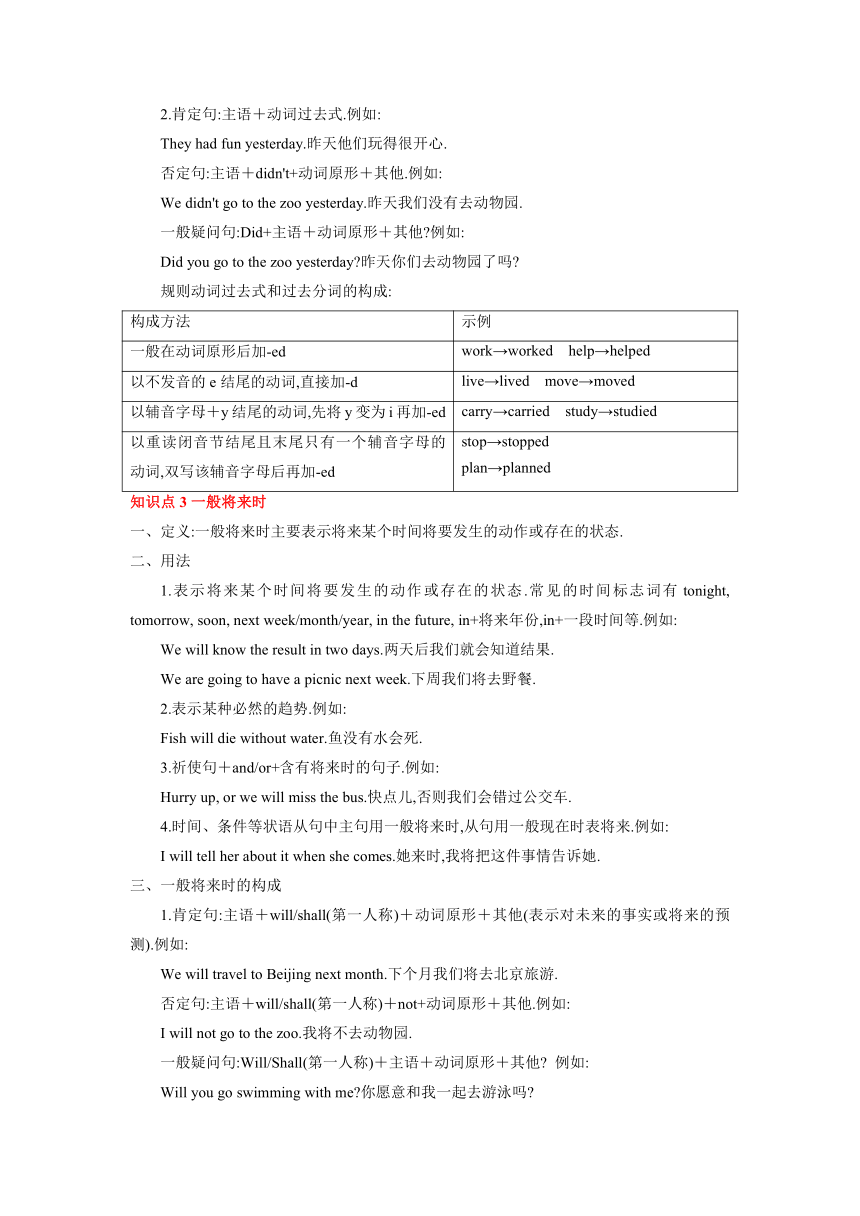
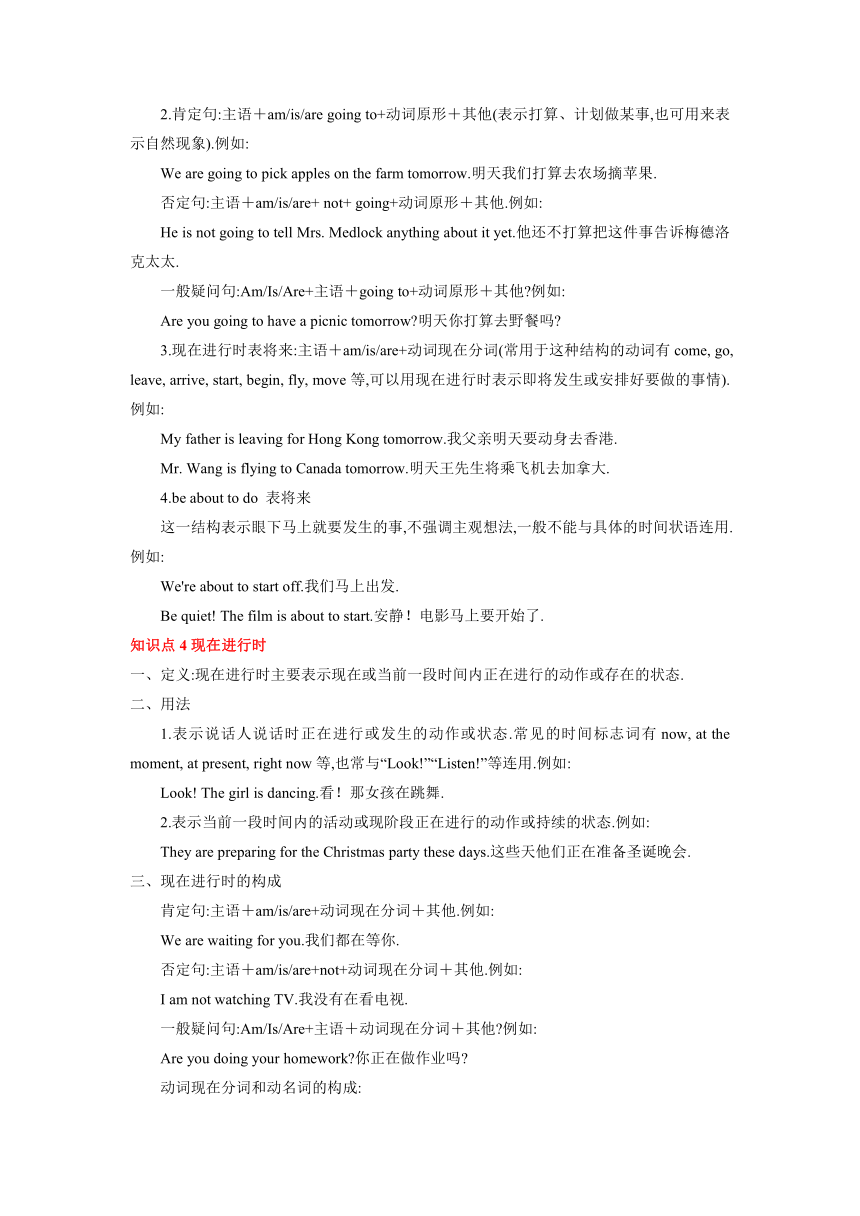
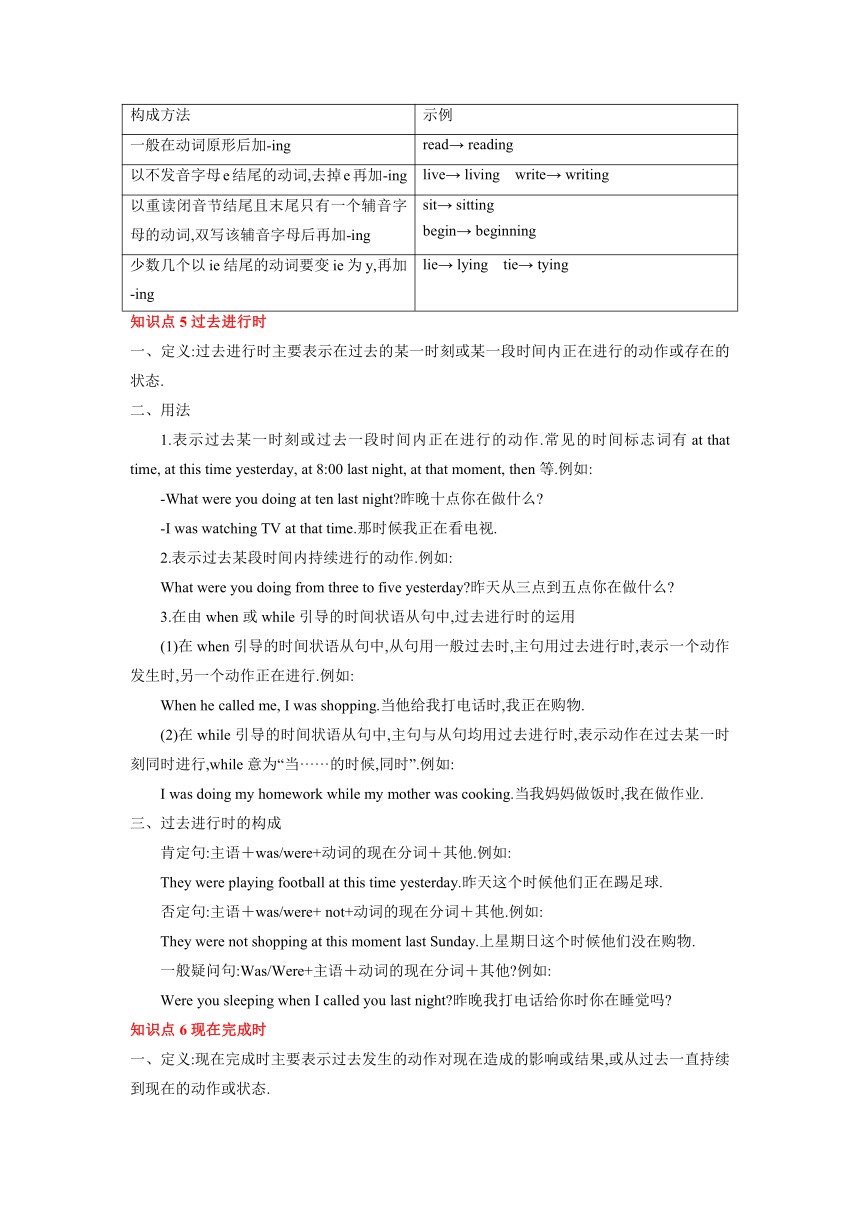
文档简介
专题八 动词的时态和语态
一对一“梳理”知识点
高效复习法
动词的时态是中考单项选择中考查的重点,主要涉及六种基本时态的结构和表示的意义.考生备考时应注意熟练掌握六种基本时态所表示的意义,以及其结构和相关时间状语.解答此类试题时,可根据具体语境、标志词、从句和主句的时态搭配、固定句型等判断技巧来解题.
动词的语态也是中考单项选择中考查的重点,选项设置上通常是语态和时态的结合.在解答此类试题时,考生首先应判断题目是否考查被动语态,有两种方法:①根据被动语态的基本结构来判断,若动作的承受者(动作的对象,多是名词或代词)在空前,实施者在空后(有时也省略),则用被动语态.②首先,根据主语与谓语之间的逻辑关系来判断,若主语与谓语之间是动宾关系,则用被动语态.其次,根据语境、给出的时间状语或已经发生动作的时态来确定正确的时态.最后,根据被动语态的结构,选出动词的正确变形.
知识突破
知识点1一般现在时
一、定义:一般现在时主要用来表示经常性、习惯性的动作或现在的状态.
二、用法
1.表示经常性或习惯性的动作或状态.常见的时间标志词有always, usually, often, sometimes, seldom, hardly, never 等频度副词, every day/week/ month/year, once a year, twice a week, three times a month等表示频率的词组.例如:
I play football after school every afternoon.我每天下午放学后踢足球.
2.表示主语具备的性格和能力.例如:
She likes apples.她喜欢苹果.
3.表示普遍真理、客观存在、科学事实及格言警句.例如:
The sun rises in the east and sets in the west.太阳东升西落.
4.主将从现.在时间、条件等状语从句中,主句如果是一般将来时,从句用一般现在时表将来.例如:
If you leave tomorrow, I'll see you off at the airport.如果你明天离开,我会到机场送你.
三、一般现在时的构成
1.肯定句:主语+am/is/are+其他.例如:
She is a lovely girl.她是一个可爱的女孩.
否定句:主语+am/is/are+ not+其他.例如:
She isn't at home.她不在家.
一般疑问句:Am/Is/Are+主语+其他 例如:
Are you Li Ming 你是李明吗
2.肯定句:主语+动词原形/动词单三形式+其他.例如:
She likes playing football.她喜欢踢足球.
否定句:主语+don't/doesn't+动词原形+其他.例如:
She doesn't like playing football.她不喜欢踢足球.
一般疑问句:Do/Does+主语+动词原形+其他 例如:
Do you like playing football 你喜欢踢足球吗
动词第三人称单数的构成规则:
构成方法 示例
一般情况下在动词原形后加-s like→likes help→helps
以字母ch, sh, s, o, x结尾的动词,在词尾加-es do→does box→boxes
以辅音字母+y结尾的动词,先将y变i再加-es fly→flies study→studies
以元音字母+y结尾的动词,直接在词尾加-s play→plays stay→stays
知织点2一般过去时
一、定义:一般过去时主要表示过去某一时间所发生的动作或存在的状态.
二、用法
1.表示过去某个时间所发生的动作或存在的状态.常见的时间标志词有 yesterday, ago, last night/week/month, just now, in the past, in+过去的年份,once upon a time等.例如:
They went to Shanghai yesterday.他们昨天去了上海.
2.表示过去经常性或习惯性的动作.常与always, usually, often, sometimes, never等频度副词连用.例如:
When I was in the countryside, I often swam in the river.我在乡下时,经常去河里游泳.
3.在since引导的时间状语从句中,从句用一般过去时.例如:
My uncle has taught in the school since he came to Beijing.我叔叔自从到北京以来一直在这所学校教书.
三、一般过去时的构成
1.肯定句:主语+was/were+其他.例如:
She was born on a cold morning.她出生在一个寒冷的早晨.
否定句:主语+was/were+ not+其他.例如:
I was not born in 2005.我不是出生在2005年.
一般疑问句:Was/Were+主语+其他 例如:
Were you born in Shanghai 你出生在上海吗
2.肯定句:主语+动词过去式.例如:
They had fun yesterday.昨天他们玩得很开心.
否定句:主语+didn't+动词原形+其他.例如:
We didn't go to the zoo yesterday.昨天我们没有去动物园.
一般疑问句:Did+主语+动词原形+其他 例如:
Did you go to the zoo yesterday 昨天你们去动物园了吗
规则动词过去式和过去分词的构成:
构成方法 示例
一般在动词原形后加-ed work→worked help→helped
以不发音的e结尾的动词,直接加-d live→lived move→moved
以辅音字母+y结尾的动词,先将y变为i再加-ed carry→carried study→studied
以重读闭音节结尾且末尾只有一个辅音字母的动词,双写该辅音字母后再加-ed stop→stopped plan→planned
知识点3一般将来时
一、定义:一般将来时主要表示将来某个时间将要发生的动作或存在的状态.
二、用法
1.表示将来某个时间将要发生的动作或存在的状态.常见的时间标志词有tonight, tomorrow, soon, next week/month/year, in the future, in+将来年份,in+一段时间等.例如:
We will know the result in two days.两天后我们就会知道结果.
We are going to have a picnic next week.下周我们将去野餐.
2.表示某种必然的趋势.例如:
Fish will die without water.鱼没有水会死.
3.祈使句+and/or+含有将来时的句子.例如:
Hurry up, or we will miss the bus.快点儿,否则我们会错过公交车.
4.时间、条件等状语从句中主句用一般将来时,从句用一般现在时表将来.例如:
I will tell her about it when she comes.她来时,我将把这件事情告诉她.
三、一般将来时的构成
1.肯定句:主语+will/shall(第一人称)+动词原形+其他(表示对未来的事实或将来的预测).例如:
We will travel to Beijing next month.下个月我们将去北京旅游.
否定句:主语+will/shall(第一人称)+not+动词原形+其他.例如:
I will not go to the zoo.我将不去动物园.
一般疑问句:Will/Shall(第一人称)+主语+动词原形+其他 例如:
Will you go swimming with me 你愿意和我一起去游泳吗
2.肯定句:主语+am/is/are going to+动词原形+其他(表示打算、计划做某事,也可用来表示自然现象).例如:
We are going to pick apples on the farm tomorrow.明天我们打算去农场摘苹果.
否定句:主语+am/is/are+ not+ going+动词原形+其他.例如:
He is not going to tell Mrs. Medlock anything about it yet.他还不打算把这件事告诉梅德洛克太太.
一般疑问句:Am/Is/Are+主语+going to+动词原形+其他 例如:
Are you going to have a picnic tomorrow 明天你打算去野餐吗
3.现在进行时表将来:主语+am/is/are+动词现在分词(常用于这种结构的动词有come, go, leave, arrive, start, begin, fly, move等,可以用现在进行时表示即将发生或安排好要做的事情).例如:
My father is leaving for Hong Kong tomorrow.我父亲明天要动身去香港.
Mr. Wang is flying to Canada tomorrow.明天王先生将乘飞机去加拿大.
4.be about to do 表将来
这一结构表示眼下马上就要发生的事,不强调主观想法,一般不能与具体的时间状语连用.例如:
We're about to start off.我们马上出发.
Be quiet! The film is about to start.安静!电影马上要开始了.
知识点4现在进行时
一、定义:现在进行时主要表示现在或当前一段时间内正在进行的动作或存在的状态.
二、用法
1.表示说话人说话时正在进行或发生的动作或状态.常见的时间标志词有now, at the moment, at present, right now等,也常与“Look!”“Listen!”等连用.例如:
Look! The girl is dancing.看!那女孩在跳舞.
2.表示当前一段时间内的活动或现阶段正在进行的动作或持续的状态.例如:
They are preparing for the Christmas party these days.这些天他们正在准备圣诞晚会.
三、现在进行时的构成
肯定句:主语+am/is/are+动词现在分词+其他.例如:
We are waiting for you.我们都在等你.
否定句:主语+am/is/are+not+动词现在分词+其他.例如:
I am not watching TV.我没有在看电视.
一般疑问句:Am/Is/Are+主语+动词现在分词+其他 例如:
Are you doing your homework 你正在做作业吗
动词现在分词和动名词的构成:
构成方法 示例
一般在动词原形后加-ing read→ reading
以不发音字母e结尾的动词,去掉e再加-ing live→ living write→ writing
以重读闭音节结尾且末尾只有一个辅音字母的动词,双写该辅音字母后再加-ing sit→ sitting begin→ beginning
少数几个以ie结尾的动词要变ie为y,再加-ing lie→ lying tie→ tying
知识点5过去进行时
一、定义:过去进行时主要表示在过去的某一时刻或某一段时间内正在进行的动作或存在的状态.
二、用法
1.表示过去某一时刻或过去一段时间内正在进行的动作.常见的时间标志词有at that time, at this time yesterday, at 8:00 last night, at that moment, then等.例如:
-What were you doing at ten last night 昨晚十点你在做什么
-I was watching TV at that time.那时候我正在看电视.
2.表示过去某段时间内持续进行的动作.例如:
What were you doing from three to five yesterday 昨天从三点到五点你在做什么
3.在由when或while引导的时间状语从句中,过去进行时的运用
(1)在when引导的时间状语从句中,从句用一般过去时,主句用过去进行时,表示一个动作发生时,另一个动作正在进行.例如:
When he called me, I was shopping.当他给我打电话时,我正在购物.
(2)在while引导的时间状语从句中,主句与从句均用过去进行时,表示动作在过去某一时刻同时进行,while意为“当······的时候,同时”.例如:
I was doing my homework while my mother was cooking.当我妈妈做饭时,我在做作业.
三、过去进行时的构成
肯定句:主语+was/were+动词的现在分词+其他.例如:
They were playing football at this time yesterday.昨天这个时候他们正在踢足球.
否定句:主语+was/were+ not+动词的现在分词+其他.例如:
They were not shopping at this moment last Sunday.上星期日这个时候他们没在购物.
一般疑问句:Was/Were+主语+动词的现在分词+其他 例如:
Were you sleeping when I called you last night 昨晚我打电话给你时你在睡觉吗
知识点6现在完成时
一、定义:现在完成时主要表示过去发生的动作对现在造成的影响或结果,或从过去一直持续到现在的动作或状态.
二、用法
1.表示过去发生或已经完成的动作对现在造成的影响或结果.常与recently, already, yet, just, ever, before, never等连用.例如:
I have already read the book.我已经读过这本书了.
2.表示从过去开始持续到现在的动作或状态,也许还要持续下去.常和 so far, these days, for+时间段,since+时间点等连用,谓语动词多为延续性动词.例如:
She has taught in the school for ten years.她在这所学校教书已经十年了.
3.“It/This is the+序数词+time+ that...”句型和“It/This is the+最高级+名词+that...”句型中,that引导的从句用现在完成时.例如:
It is the first time that I have cooked delicious lunch for my parents.这是我第一次为我的父母做美味的午餐.
This is the best film that I have ever seen.这是我看过的最好的电影.
4.延续性动词与非延续性动词的用法
现在完成时表示动词从过去某个时候开始一直持续到现在,与一段时间连用时,应注意肯定句中的谓语动词应是延续性动词,非延续性动词不能和一段时间连用.例如:
他借用我的字典已经两天了.
He has borrowed my dictionary for two days.(×)
He has kept my dictionary for two days.(√)
非延续性动词与延续性动词的转换:
非延续性动词 延续性动词 非延续性动词 延续性动词
borrow/lend keep die be dead
buy have marry be married
come be here become be
go be there lose be lost
begin/start be on join be in/be a member of
finish be over arrive/reach be(in)
open be open catch a cold have a cold
close be closed wake up be awake
5.辨析 have gone to, have been to 与 have been in
短语 含义及用法 示例
have gone to “去了某地”,强调去了,还未回来,现在不在这儿 They have gone to Lanzhou. 他们到兰州去了.(还未回来)
have been to “曾经去过某地”,强调去过,已经回来,常与表示次数的词连用 They have been to Lanzhou. 他们曾经去过兰州.(已经回来了)
have been in “在······待······”,强调一直待在某地,常与表示一段时间的时间状语连用 They have been in Lanzhou for two years. 他们已经在兰州待了两年了.
三、现在完成时的构成
1.肯定句:主语+have/has+动词过去分词+其他.例如:
I have finished my homework.我已经完成我的作业了.
2.否定句:主语+have/has+not+动词过去分词+其他.例如:
He has not arrived at home yet.他还没有到家.
3.一般疑问句:Have/Has+主语+动词过去分词+其他 例如:
Have you been to China 你曾经去过中国吗
4.规则动词过去分词的构成与过去式的构成一样,见规则动词过去式的构成.
知识点7动词的语态
一、定义:语态是表示主语和动词之间关系的动词形式,分为主动语态和被动语态.主动语态表示主语是动作的发出者,被动语态表示主语是动作的承受者.
二、用法
1.被动语态的构成:基本结构为be+动词的过去分词,被动语态强调动词的承受者,其执行者有时不必提及,如要提及,用“by+动作执行者”短语.
常考的被动语态的构成:
时态 被动语态 示例
一般现在时 am/is/are+动词过去分词 The room is cleaned (by her) every day.房间每天都(由她)打扫.
一般过去时 was/were+动词过去分词 My car was stolen last night.我的车昨晚被偷了.
一般将来时 will/shall(第一人称)+be+动词过去分词 Some trees will be planted this week. 本周将会种一些树.
现在完成时 have/has been+动词过去分词 The task has been finished by them. 任务已经被他们完成了.
含情态动词 情态动词+be+动词过去分词 Wasted paper shouldn't be thrown here. 废纸不应该被扔在这里.
2.主动语态变被动语态的方法
3.使用被动语态的情况
(1)不知道或没必要提到动作的执行者是谁时,常用被动语态.例如:
The book was published in 2012.这本书是2012年出版的.
(2)需要强调或突出动作的承受者,这类句子常有一个by引导的短语说明动作的执行者.例如:
This poem is written by Li Bai.这首诗是由李白写的.
(3)句子的主语是物时,多用被动语态.例如:
This kind of car is made in China.这种汽车是中国制造的.
(4)动作的执行者不是人时,多用被动语态.例如:
The window was blown open by wind.窗户被风吹开了.
4.主动结构表被动意义的情况
(1)open, lock, write, read, sell, wash, clean等作不及物动词时,它们的主语为物,可用主动结构表被动意义.例如:
This kind of pen sells very well.这种钢笔卖得很好.
(2)look, sound, taste, smell等感官动词用主动结构表被动意义.例如:
The food looks bad, but it tastes good.这食物看起来不好,但是尝起来很可口.
(3)be worth doing“值得做”,用主动结构表被动意义.例如:
This book is worth reading.这本书值得一读.
(4)want, need, require等动词表示“需要”时,后面常可跟doing形式表被动,相当于to be done,即“want/need/require+ doing”相当于“want/need/require+ to be done”.例如:
Your car needs washing.=Your car needs to be washed.你的汽车需要清洗了.
5.被动语态结构的习惯用法
It is said that...据说······
It is reported that...据报道······
It is well known that...众所周知······
It is thought that...大家认为······
It is believed that...大家相信······
核心考点,各个击破
考点1动词的时态
例1(2021·湖南湘潭,25题,1分)
Look! Many people________ in the park.
A. dance B. are dancing C. were dancing
【解析】本题考查动词时态.句意:看!很多人正在公园里跳舞.句前有“Look!”提示,句子常用现在进行时.答案:B
例2(2021·河北,36题,1分)
You can borrow this film-surely you________ watching it.
A. enjoy B. enjoyed C. will enjoy D. have enjoyed
【解析】本题考查动词时态辨析.句意:你可以借这部电影,你肯定会喜欢看的.分析“You can borrow this film-surely you...watching it.”可知,此处动作还未发生,用一般将来时.答案:C
针对性练习1
1.-Mom,where is Dad
-He________ flowers in the garden now.
A. planted B. plants C. will plant D. is planting
2. -I called you yesterday evening, but nobody answered.
-Oh, ________ at that time.
A. I'm cooking B.I cooked C.I cook D.I was cooking
3.-Is your father a doctor
-Yes, he is. He________ in Town Hospital.
A. has worked B. is working C. works D. worked
考点2动词的语态
例3(2021·黑龙江龙东,16题,1分)
Our sports meeting________ until the end of July.
A. puts off B. will put off C. will be put off
【解析】本题考查动词被动语态的用法.句意:我们的运动会将被推迟到七月末.根据句意,这是考查一般将来时的被动语态,A是一般现在时、主动语态;B是一般将来时、主动语态;C是一般将来时、被动语态.答案:C
例4(2021·江苏扬州,13题,1分)
-Do we have to read anything next week, Mr. Wu
-Sure. You________ to read Black Beauty from pages 58 to 85.
A. were expected B. will expect C. are expecting D. are expected
【解析】本题考查动词被动语态的用法.句意:-吴老师,下周我们一定要读一些什么吗 -当然,你们要读《黑骏马》,从58页读到85页.主语you和谓语动词expect之间存在动宾关系,意为“期待你们”,用被动语态表达;expect“期待”表达的是客观事实,句子时态是一般现在时,因此用一般现在时的被动语态,主语是you, be动词用are, expect的过去分词是expected.答案:D
针对性练习2
1.We're sure that the environment in our city________ greatly through our work in the near future.
A. improved B. was improved C. has improved D. will be improved
2. The pet dog is warm and loving. It________ as a daughter of my family.
A. treats B. treated C. is treated D. was treated
3.-Can you sing this English song
-Of course, I can. It________ many times on the radio.
A. taught B. has taught C. is taught D. has been taught
答案:
针对性练习1:1.D 2.D 3.C
针对性练习2:1.D 2.C 3.D
从模拟演练到实战操作
模拟演练
1.(2021·甘肃平凉一模)Tom, together with his friends, often________ to the old people's home to cheer them up.
A. go B. goes C. going D. went
2.(2021·福建南平模拟)-See The strange man________ around our house again. Should we call the police
-Oh, no. He is our new neighbor.
A. walks B. has walked C. is walking
3.(2021·湖南邵阳二模)-Do you know Shaoyang very well, Mrs. Chen
-Sure, I________ here since I was born.
A. live B. lived C. have lived
4.(2021·河北承德一模)He likes collecting stamps. Most of his money________ on stamps.
A. has spent B. spends C. is spent D. are spent
5.(2021·北京丰台区二模)Claire likes cooking. She________ delicious food every weekend.
A. will cook B. has cooked C. is cooking D. cooks
6.(2021·黑龙江哈尔滨一模)Recently a lot of Chinese________ buying some brands to support Xinjiang cotton.
A. have stopped B. stopped C. stops
7.(2021·湖北黄冈二模)-Did you borrow the book from the library last week
-Yes. I________ it for a week.
A. borrowed B. have borrowed C. have kept D. will borrow
8.(2021·吉林长春二模)The policeman________ a speech on how to protect personal information next week.
A. will give B. gives C. gave D. has given
9.(2021·河北张家口一模)Just as we know, most of the rice________ in the south of our country.
A. grew B. is grown C. was grown D. has grown
10.(2021·山东济南模拟)-Summer vacation is coming. What's your plan
-I________ my grandparents in the countryside.
A. visit B. visited C. will visit D. was visiting
11.(2021·黑龙江大庆一模)-This kind of cloth looks nice. ________ it________ soft
-Sure. It's made of silk.
A. Is; felt B. Was; felt C. Did; feel D. Does; feel
12.(2021·天津河东区模拟)Her dog________ for two months. She still misses it very much.
A. died B. has died C. has been dead D. has been died
13.(2021·河北石家庄模拟)The city is famous as the "Forest City". Two thirds of the area________ with green trees.
A. covers B. covered C. is covered D. is covering
14.(2021·江苏镇江二模)-Helen, how was your English competition on Monday
-I have no idea; I________ for the result. I was told it would come out in two days.
A. was waiting B. waited C. will wait D. am waiting
15.(2021·新疆伊犁二模)-I called you last night, but nobody answered. Where were you then
-Oh, I________ my pet dog in my yard.
A. walked B. was walking C. am walking D. will walk
16.(2021·天津西青区一模)Though Confucius has been dead for such a long time, we________ still________ by his ideas.
A. were; influenced B. have; been influenced C. are; influenced D. will; be influenced
17.(2021·江苏盐城一模)-If you________ another chance next time, can you do it better, Jack
-That's for sure. Trust me!
A. give B. will give C. are given D. will be given
18.(2021·河北秦皇岛一模)A baby's first month birthday is a special event in China and________ with a special party.
A. celebrates B. is celebrated C. was celebrated D. will celebrate
19.(2021·河北石家庄二模)We didn't get into the room because the door________.
A. locked B. is locked C. has locked D. was locked
答案:
1.B 2.C 3.C
4.C【解析】本题考查动词被动语态的用法.句意:他喜欢集邮,大部分钱都花在邮票上了.本题的时态属于一般现在时,句中“money”和“spend”之间是被动关系,又因为money是不可数名词,根据一般现在时的被动语态构成“be+ done”可知,be动词应该用is,spend的过去分词为spent.
5.D【解析】本题考查动词时态辨析.句意:克莱尔喜欢做饭,她每个周末都做美味的食物.根据时间状语“every weekend”可确定本句时态为一般现在时,主语she为第三人称单数,因此谓语动词应填人cook的单三形式cooks.
6.A 7.C 8.A
9.B【解析】本题考查动词被动语态的用法.句意:正如我们所知道的,大部分的水稻是在我国南方种植的.分析句子可知,主语“most of the rice”和谓语动词“grow”之间是被动关系,意为“被种植”;且主语是不可数名词,be动词用is;句子陈述客观事实,因此应用一般现在时的被动语态.
10.C
11.D【解析】本题考查动词时态辨析.句意:-这种布看起来不错,摸上去软吗 -当然,它是丝绸做的.此处是陈述事物的本身属性,应用主动形式,陈述事实用一般现在时,主语是it,动词是feel,变成疑问句要加助动词does.
12.C【解析】本题考查动词时态辨析.句意:她的狗已经去世两个月了,但她仍然非常想念它.died一般过去时;has died 现在完成时;has been dead现在完成时,表示状态,延续性动词,可以和时间段连用;没有has been died这种用法,die不是及物动词,所以died不可用于被动语态.根据“for two months”可知,此句时态用现在完成时,动词用延续性动词,die为短
暂性动词,需用be dead.
13.C
14.D【解析】本题考查动词时态辨析.句意:-海伦,你星期一的英语比赛怎么样 -我不知道,我正在等结果.有人告诉我两天后出结果.根据“I have no idea”可知,此处表示“我现在不知道,现在正在等结果”,因此用现在进行时.
15.B
16.C【解析】本题考查动词的时态辨析和被动语态的用法.句意:尽管孔子已经逝世很长时间了,我们仍然被他的观点影响着.句子是一般现在时,主语“we”和动词“influence”之间是被动关系,用一般现在时的被动形式“are influenced”.
17.C【解析】本题考查动词的时态辨析和被动语态的用法.句意:-如果下次再给你另一个机会,你能做得更好吗,杰克 -那是肯定的,相信我!根据语境,“you”是动词“give”的承受者,可知用被动语态be done结构,可排除A、B两项;本句是条件状语从句,用一般现在时代替一般将来时.
18.B【解析】本题考查动词的时态辨析和被动语态的用法.句意:在中国,小孩满月是一件大事,会举办一个特别的派对来庆祝.本句话中,主语为“A baby's first month birthday”,与谓语“celebrate”之间为动宾关系,用被动语态,排除A和D;且本句话描述的是一个客观事实,应用一般现在时的被动语态.
19.D【解析】本题考查动词的时态辨析和被动语态的用法.句意:我们没有进入房间,因为门是锁着的.根据题干的理解可知是“门被锁起来了”,应用被动语态,又因主句时态是一般过去时,所以从句也应使用一般过去时,一般过去时的被动语态结构为was/were+动词的过去分词,主语the door是单数,用was, lock的过去分词是locked.
真题演练
1.(2021·河北)I saw Bob in the garden. He________ flowers there.
A. waters B. has watered C. is watering D. was watering
2.(2021·湖南怀化)-May I use your dictionary
-Sorry, I________ it now.
A. am using B. use C. used
3.(2021·北京)-Lily, what do you usually do after school
-I________ exercise with my friends.
A. do B. did C. will do D. was doing
4.(2021·江苏南京)I saw Julia in April and I________ her since then.
A. don't see B. didn't see C. won't see D. haven't seen
5.(2022·河北)John is waiting for me. We________ to the bookstore together.
A. went B. have gone C. will go D. were going
6.(2021·四川达州)-Alice has gone out.
-Oh, has she What time________ she________
A. has; gone B. will; go C. did; go D. is: going
7.(2021·山东菏泽)-It is reported that the First Flight Ceremony of Heze Mudan Airport was held on April 2nd,2021.
-Yes. Great changes________ in my hometown since I left home.
A. have taken place B. were taken place C. took place
8.(2021·天津)-Where is Mom
-In the living room. She________ a book at the moment.
A. was reading B. will read C. is reading D. has read
9.(2021·湖北武汉)-We________ very simply and do not spend much money on food.
-That's why you're called the “Greens”.
A.eat B.ate C. will eat D. had eaten
10.(2021·云南昆明)-What did you do this Dragon Boat Festival
-I________ the boat races on TV and read books.
A. watch B. watched C. am watching D. will watch
11.(2021·重庆A卷)Listen! Our science teacher________ the use of the robot.
A. explains B. explained C. is explaining D. has explained
12.(2021·四川遂宁)-I________ when you called me at 8:00 last night.
-No wonder you didn't pick it up.
A. was taking a shower B. am taking a shower C. took a shower D. take a shower
13.(2021·江苏南京)Our school library________ with plants, lovely desks and chairs, so I feel relaxed while studying or reading there.
A. decorates B. decorated C. is decorated D. was decorating
14.(2021·云南昆明)A lot of teenagers think as they are older and wiser, they________ to make their own decisions.
A. should allow B. shouldn't allow C. should be allowed D. shouldn't be allowed
15.(2021·河北)These gifts________ by children in their last summer holidays.
A. made B. were made C. make D. are made
16.(2021·江苏苏州)Now teenagers________ to do voluntary work for their local communities.
A. are encouraged B. were encouraged C. have encouraged D. are encouraging
17.(2021·浙江温州)My father________ me a funny joke and I can't stop laughing every time I think of it.
A. told B. tells C. will tell D. is telling
18.(2020·北京)The kite________ in China more than 2,000 years ago.
A. invents B. invented C. is invented D. was invented
19.(2020·上海)Every year thousands of tourists________ the mountain area to relax themselves.
A. visited B. were visiting C. visit D. have visited
答案:
1.D【解析】本题考查动词时态辨析.句意:我在花园里看见鲍勃了,他在那里浇花.根据“I saw Bob in the garden.”可知,此处强调在过去的某个时间点正在发生的动作,用过去进行时.
2.A【解析】本题考查动词时态辨析.句意:-我能用一下你的字典吗 -对不起,我正在用呢.am using 现在进行时;use一般现在时;used一般过去时.通过上文“对不起”可知“我正在用呢”,应用现在进行时.
3.A【解析】本题考查动词的时态辨析.句意:-莉莉,放学后你通常做什么 -我和我的朋友们一起锻炼.根据问句中的“usually”可知,询间的是经常反复发生的动作,用一般现在时表达.
4.D【解析】本题考查动词时态辨析.句意:四月份我看到过朱莉娅,自那以后我再没见过她.“since then”是现在完成时的时间状语,所以句子需要用现在完成时.
5.C【解析】本题考查动词时态辨析.句意:约翰在等我.我们将一起去书店.根据句意可知,事情还未发生,应用一般将来时.
6.C
7.A【解析】本题考查动词时态辨析.句意:-据报道,2021年4月2日菏泽牡丹机场举行了首飞仪式.-是的.自从我离开家之后,家乡发生了很大变化.连词since后跟一个表示一般过去时态的句子,据此推断主句应用现在完成时.
8.C【解析】本题考查动词时态辨析.句意:-妈妈在哪儿 -在客厅,她这时正在看书.根据句中的“at the moment”和语境可知,此句应用现在进行时.
9.A【解析】本题考查动词时态辨析.句意:-我们吃得非常简单,在食物方面不花多少钱.-那就是你们被称为““绿色'一家人”的原因.此处叙述的是我们平时的生活情况,故应用一般现在时表达.
10.B【解析】本题考查动词时态辨析.由上文问句中的助动词“did”可知,考查的是一般过去时,提示答语也用一般过去时.
11.C【解析】本题考查动词时态辨析.句意:听!我们的科学老师正在讲解机器人的用途.explains第三人称单数形式,用于一般现在时;explained 过去式,用于一般过去时;explaining动词的现在分词,用于现在进行时;has explained 是现在完成时的结构.句中“Listen!”构成祈使句,提示谓语动词用现在进行时.
12.A【解析】本题考查动词时态辨析.句意:-你昨晚8点给我打电话的时候,我正在洗澡.-难怪你没接电话.固定短语take a shower,意为“洗澡”.上句含有when引导的时间状语从句,从句的动作发生在过去具体的某一个时刻,所以主句时态应用过去进行时,其结构是“was/were+动词的现在分词”.
13.C【解析】本题考查动词语态辨析.句意:我们学校的图书馆装饰着植物和可爱的桌椅,所以我在那里学习或阅读时感到很放松.由语境可知,使用一般现在时;“school library”与“decorate”之间存在被动关系,此处应使用被动语态.
14.C【解析】本题考查动词被动语态的用法.句意:许多青少年认为随着他们年龄和智慧的增长,应当允许他们自己做出决定.主语“they”和“allow”存在被动关系,情态动词should应该用其被动语态形式,即“情态动词+be+及物动词过去分词”.
15.B【解析】本题考查动词的时态辨析和被动语态的用法.句意:这些礼物是孩子们在上一个暑假里做的.主语“gifts”与谓语“make”之间为被动关系,故应用“be动词+过去分词”的被动语态结构,且根据“last summer holidays”可知句子应用过去时,故空格处应用一般过去时的被动语态结构.
16.A【解析】本题考查动词的时态辨析和被动语态的用法.句意:现在人们鼓励青少年为当地社区做义工.时间状语“now”提示用一般现在时,主语“teenagers”和谓语“encourage”存在被动关系.故空格处应用一般现在时的被动语态表达.
17.A【解析】本题考查动词时态辨析.句意:父亲给我讲了个笑话,我每次想起来都忍不住大笑.told一般过去时;tells一般现在时;will tell一般将来时;is telling现在进行时.此题为and连接的并列句,后边用can't做干扰,很容易判断成一般现在时.而句意“每次想起都会笑”说明故事是讲过了的,所以应该用一般过去时.
18.D 19.C
一对一“梳理”知识点
高效复习法
动词的时态是中考单项选择中考查的重点,主要涉及六种基本时态的结构和表示的意义.考生备考时应注意熟练掌握六种基本时态所表示的意义,以及其结构和相关时间状语.解答此类试题时,可根据具体语境、标志词、从句和主句的时态搭配、固定句型等判断技巧来解题.
动词的语态也是中考单项选择中考查的重点,选项设置上通常是语态和时态的结合.在解答此类试题时,考生首先应判断题目是否考查被动语态,有两种方法:①根据被动语态的基本结构来判断,若动作的承受者(动作的对象,多是名词或代词)在空前,实施者在空后(有时也省略),则用被动语态.②首先,根据主语与谓语之间的逻辑关系来判断,若主语与谓语之间是动宾关系,则用被动语态.其次,根据语境、给出的时间状语或已经发生动作的时态来确定正确的时态.最后,根据被动语态的结构,选出动词的正确变形.
知识突破
知识点1一般现在时
一、定义:一般现在时主要用来表示经常性、习惯性的动作或现在的状态.
二、用法
1.表示经常性或习惯性的动作或状态.常见的时间标志词有always, usually, often, sometimes, seldom, hardly, never 等频度副词, every day/week/ month/year, once a year, twice a week, three times a month等表示频率的词组.例如:
I play football after school every afternoon.我每天下午放学后踢足球.
2.表示主语具备的性格和能力.例如:
She likes apples.她喜欢苹果.
3.表示普遍真理、客观存在、科学事实及格言警句.例如:
The sun rises in the east and sets in the west.太阳东升西落.
4.主将从现.在时间、条件等状语从句中,主句如果是一般将来时,从句用一般现在时表将来.例如:
If you leave tomorrow, I'll see you off at the airport.如果你明天离开,我会到机场送你.
三、一般现在时的构成
1.肯定句:主语+am/is/are+其他.例如:
She is a lovely girl.她是一个可爱的女孩.
否定句:主语+am/is/are+ not+其他.例如:
She isn't at home.她不在家.
一般疑问句:Am/Is/Are+主语+其他 例如:
Are you Li Ming 你是李明吗
2.肯定句:主语+动词原形/动词单三形式+其他.例如:
She likes playing football.她喜欢踢足球.
否定句:主语+don't/doesn't+动词原形+其他.例如:
She doesn't like playing football.她不喜欢踢足球.
一般疑问句:Do/Does+主语+动词原形+其他 例如:
Do you like playing football 你喜欢踢足球吗
动词第三人称单数的构成规则:
构成方法 示例
一般情况下在动词原形后加-s like→likes help→helps
以字母ch, sh, s, o, x结尾的动词,在词尾加-es do→does box→boxes
以辅音字母+y结尾的动词,先将y变i再加-es fly→flies study→studies
以元音字母+y结尾的动词,直接在词尾加-s play→plays stay→stays
知织点2一般过去时
一、定义:一般过去时主要表示过去某一时间所发生的动作或存在的状态.
二、用法
1.表示过去某个时间所发生的动作或存在的状态.常见的时间标志词有 yesterday, ago, last night/week/month, just now, in the past, in+过去的年份,once upon a time等.例如:
They went to Shanghai yesterday.他们昨天去了上海.
2.表示过去经常性或习惯性的动作.常与always, usually, often, sometimes, never等频度副词连用.例如:
When I was in the countryside, I often swam in the river.我在乡下时,经常去河里游泳.
3.在since引导的时间状语从句中,从句用一般过去时.例如:
My uncle has taught in the school since he came to Beijing.我叔叔自从到北京以来一直在这所学校教书.
三、一般过去时的构成
1.肯定句:主语+was/were+其他.例如:
She was born on a cold morning.她出生在一个寒冷的早晨.
否定句:主语+was/were+ not+其他.例如:
I was not born in 2005.我不是出生在2005年.
一般疑问句:Was/Were+主语+其他 例如:
Were you born in Shanghai 你出生在上海吗
2.肯定句:主语+动词过去式.例如:
They had fun yesterday.昨天他们玩得很开心.
否定句:主语+didn't+动词原形+其他.例如:
We didn't go to the zoo yesterday.昨天我们没有去动物园.
一般疑问句:Did+主语+动词原形+其他 例如:
Did you go to the zoo yesterday 昨天你们去动物园了吗
规则动词过去式和过去分词的构成:
构成方法 示例
一般在动词原形后加-ed work→worked help→helped
以不发音的e结尾的动词,直接加-d live→lived move→moved
以辅音字母+y结尾的动词,先将y变为i再加-ed carry→carried study→studied
以重读闭音节结尾且末尾只有一个辅音字母的动词,双写该辅音字母后再加-ed stop→stopped plan→planned
知识点3一般将来时
一、定义:一般将来时主要表示将来某个时间将要发生的动作或存在的状态.
二、用法
1.表示将来某个时间将要发生的动作或存在的状态.常见的时间标志词有tonight, tomorrow, soon, next week/month/year, in the future, in+将来年份,in+一段时间等.例如:
We will know the result in two days.两天后我们就会知道结果.
We are going to have a picnic next week.下周我们将去野餐.
2.表示某种必然的趋势.例如:
Fish will die without water.鱼没有水会死.
3.祈使句+and/or+含有将来时的句子.例如:
Hurry up, or we will miss the bus.快点儿,否则我们会错过公交车.
4.时间、条件等状语从句中主句用一般将来时,从句用一般现在时表将来.例如:
I will tell her about it when she comes.她来时,我将把这件事情告诉她.
三、一般将来时的构成
1.肯定句:主语+will/shall(第一人称)+动词原形+其他(表示对未来的事实或将来的预测).例如:
We will travel to Beijing next month.下个月我们将去北京旅游.
否定句:主语+will/shall(第一人称)+not+动词原形+其他.例如:
I will not go to the zoo.我将不去动物园.
一般疑问句:Will/Shall(第一人称)+主语+动词原形+其他 例如:
Will you go swimming with me 你愿意和我一起去游泳吗
2.肯定句:主语+am/is/are going to+动词原形+其他(表示打算、计划做某事,也可用来表示自然现象).例如:
We are going to pick apples on the farm tomorrow.明天我们打算去农场摘苹果.
否定句:主语+am/is/are+ not+ going+动词原形+其他.例如:
He is not going to tell Mrs. Medlock anything about it yet.他还不打算把这件事告诉梅德洛克太太.
一般疑问句:Am/Is/Are+主语+going to+动词原形+其他 例如:
Are you going to have a picnic tomorrow 明天你打算去野餐吗
3.现在进行时表将来:主语+am/is/are+动词现在分词(常用于这种结构的动词有come, go, leave, arrive, start, begin, fly, move等,可以用现在进行时表示即将发生或安排好要做的事情).例如:
My father is leaving for Hong Kong tomorrow.我父亲明天要动身去香港.
Mr. Wang is flying to Canada tomorrow.明天王先生将乘飞机去加拿大.
4.be about to do 表将来
这一结构表示眼下马上就要发生的事,不强调主观想法,一般不能与具体的时间状语连用.例如:
We're about to start off.我们马上出发.
Be quiet! The film is about to start.安静!电影马上要开始了.
知识点4现在进行时
一、定义:现在进行时主要表示现在或当前一段时间内正在进行的动作或存在的状态.
二、用法
1.表示说话人说话时正在进行或发生的动作或状态.常见的时间标志词有now, at the moment, at present, right now等,也常与“Look!”“Listen!”等连用.例如:
Look! The girl is dancing.看!那女孩在跳舞.
2.表示当前一段时间内的活动或现阶段正在进行的动作或持续的状态.例如:
They are preparing for the Christmas party these days.这些天他们正在准备圣诞晚会.
三、现在进行时的构成
肯定句:主语+am/is/are+动词现在分词+其他.例如:
We are waiting for you.我们都在等你.
否定句:主语+am/is/are+not+动词现在分词+其他.例如:
I am not watching TV.我没有在看电视.
一般疑问句:Am/Is/Are+主语+动词现在分词+其他 例如:
Are you doing your homework 你正在做作业吗
动词现在分词和动名词的构成:
构成方法 示例
一般在动词原形后加-ing read→ reading
以不发音字母e结尾的动词,去掉e再加-ing live→ living write→ writing
以重读闭音节结尾且末尾只有一个辅音字母的动词,双写该辅音字母后再加-ing sit→ sitting begin→ beginning
少数几个以ie结尾的动词要变ie为y,再加-ing lie→ lying tie→ tying
知识点5过去进行时
一、定义:过去进行时主要表示在过去的某一时刻或某一段时间内正在进行的动作或存在的状态.
二、用法
1.表示过去某一时刻或过去一段时间内正在进行的动作.常见的时间标志词有at that time, at this time yesterday, at 8:00 last night, at that moment, then等.例如:
-What were you doing at ten last night 昨晚十点你在做什么
-I was watching TV at that time.那时候我正在看电视.
2.表示过去某段时间内持续进行的动作.例如:
What were you doing from three to five yesterday 昨天从三点到五点你在做什么
3.在由when或while引导的时间状语从句中,过去进行时的运用
(1)在when引导的时间状语从句中,从句用一般过去时,主句用过去进行时,表示一个动作发生时,另一个动作正在进行.例如:
When he called me, I was shopping.当他给我打电话时,我正在购物.
(2)在while引导的时间状语从句中,主句与从句均用过去进行时,表示动作在过去某一时刻同时进行,while意为“当······的时候,同时”.例如:
I was doing my homework while my mother was cooking.当我妈妈做饭时,我在做作业.
三、过去进行时的构成
肯定句:主语+was/were+动词的现在分词+其他.例如:
They were playing football at this time yesterday.昨天这个时候他们正在踢足球.
否定句:主语+was/were+ not+动词的现在分词+其他.例如:
They were not shopping at this moment last Sunday.上星期日这个时候他们没在购物.
一般疑问句:Was/Were+主语+动词的现在分词+其他 例如:
Were you sleeping when I called you last night 昨晚我打电话给你时你在睡觉吗
知识点6现在完成时
一、定义:现在完成时主要表示过去发生的动作对现在造成的影响或结果,或从过去一直持续到现在的动作或状态.
二、用法
1.表示过去发生或已经完成的动作对现在造成的影响或结果.常与recently, already, yet, just, ever, before, never等连用.例如:
I have already read the book.我已经读过这本书了.
2.表示从过去开始持续到现在的动作或状态,也许还要持续下去.常和 so far, these days, for+时间段,since+时间点等连用,谓语动词多为延续性动词.例如:
She has taught in the school for ten years.她在这所学校教书已经十年了.
3.“It/This is the+序数词+time+ that...”句型和“It/This is the+最高级+名词+that...”句型中,that引导的从句用现在完成时.例如:
It is the first time that I have cooked delicious lunch for my parents.这是我第一次为我的父母做美味的午餐.
This is the best film that I have ever seen.这是我看过的最好的电影.
4.延续性动词与非延续性动词的用法
现在完成时表示动词从过去某个时候开始一直持续到现在,与一段时间连用时,应注意肯定句中的谓语动词应是延续性动词,非延续性动词不能和一段时间连用.例如:
他借用我的字典已经两天了.
He has borrowed my dictionary for two days.(×)
He has kept my dictionary for two days.(√)
非延续性动词与延续性动词的转换:
非延续性动词 延续性动词 非延续性动词 延续性动词
borrow/lend keep die be dead
buy have marry be married
come be here become be
go be there lose be lost
begin/start be on join be in/be a member of
finish be over arrive/reach be(in)
open be open catch a cold have a cold
close be closed wake up be awake
5.辨析 have gone to, have been to 与 have been in
短语 含义及用法 示例
have gone to “去了某地”,强调去了,还未回来,现在不在这儿 They have gone to Lanzhou. 他们到兰州去了.(还未回来)
have been to “曾经去过某地”,强调去过,已经回来,常与表示次数的词连用 They have been to Lanzhou. 他们曾经去过兰州.(已经回来了)
have been in “在······待······”,强调一直待在某地,常与表示一段时间的时间状语连用 They have been in Lanzhou for two years. 他们已经在兰州待了两年了.
三、现在完成时的构成
1.肯定句:主语+have/has+动词过去分词+其他.例如:
I have finished my homework.我已经完成我的作业了.
2.否定句:主语+have/has+not+动词过去分词+其他.例如:
He has not arrived at home yet.他还没有到家.
3.一般疑问句:Have/Has+主语+动词过去分词+其他 例如:
Have you been to China 你曾经去过中国吗
4.规则动词过去分词的构成与过去式的构成一样,见规则动词过去式的构成.
知识点7动词的语态
一、定义:语态是表示主语和动词之间关系的动词形式,分为主动语态和被动语态.主动语态表示主语是动作的发出者,被动语态表示主语是动作的承受者.
二、用法
1.被动语态的构成:基本结构为be+动词的过去分词,被动语态强调动词的承受者,其执行者有时不必提及,如要提及,用“by+动作执行者”短语.
常考的被动语态的构成:
时态 被动语态 示例
一般现在时 am/is/are+动词过去分词 The room is cleaned (by her) every day.房间每天都(由她)打扫.
一般过去时 was/were+动词过去分词 My car was stolen last night.我的车昨晚被偷了.
一般将来时 will/shall(第一人称)+be+动词过去分词 Some trees will be planted this week. 本周将会种一些树.
现在完成时 have/has been+动词过去分词 The task has been finished by them. 任务已经被他们完成了.
含情态动词 情态动词+be+动词过去分词 Wasted paper shouldn't be thrown here. 废纸不应该被扔在这里.
2.主动语态变被动语态的方法
3.使用被动语态的情况
(1)不知道或没必要提到动作的执行者是谁时,常用被动语态.例如:
The book was published in 2012.这本书是2012年出版的.
(2)需要强调或突出动作的承受者,这类句子常有一个by引导的短语说明动作的执行者.例如:
This poem is written by Li Bai.这首诗是由李白写的.
(3)句子的主语是物时,多用被动语态.例如:
This kind of car is made in China.这种汽车是中国制造的.
(4)动作的执行者不是人时,多用被动语态.例如:
The window was blown open by wind.窗户被风吹开了.
4.主动结构表被动意义的情况
(1)open, lock, write, read, sell, wash, clean等作不及物动词时,它们的主语为物,可用主动结构表被动意义.例如:
This kind of pen sells very well.这种钢笔卖得很好.
(2)look, sound, taste, smell等感官动词用主动结构表被动意义.例如:
The food looks bad, but it tastes good.这食物看起来不好,但是尝起来很可口.
(3)be worth doing“值得做”,用主动结构表被动意义.例如:
This book is worth reading.这本书值得一读.
(4)want, need, require等动词表示“需要”时,后面常可跟doing形式表被动,相当于to be done,即“want/need/require+ doing”相当于“want/need/require+ to be done”.例如:
Your car needs washing.=Your car needs to be washed.你的汽车需要清洗了.
5.被动语态结构的习惯用法
It is said that...据说······
It is reported that...据报道······
It is well known that...众所周知······
It is thought that...大家认为······
It is believed that...大家相信······
核心考点,各个击破
考点1动词的时态
例1(2021·湖南湘潭,25题,1分)
Look! Many people________ in the park.
A. dance B. are dancing C. were dancing
【解析】本题考查动词时态.句意:看!很多人正在公园里跳舞.句前有“Look!”提示,句子常用现在进行时.答案:B
例2(2021·河北,36题,1分)
You can borrow this film-surely you________ watching it.
A. enjoy B. enjoyed C. will enjoy D. have enjoyed
【解析】本题考查动词时态辨析.句意:你可以借这部电影,你肯定会喜欢看的.分析“You can borrow this film-surely you...watching it.”可知,此处动作还未发生,用一般将来时.答案:C
针对性练习1
1.-Mom,where is Dad
-He________ flowers in the garden now.
A. planted B. plants C. will plant D. is planting
2. -I called you yesterday evening, but nobody answered.
-Oh, ________ at that time.
A. I'm cooking B.I cooked C.I cook D.I was cooking
3.-Is your father a doctor
-Yes, he is. He________ in Town Hospital.
A. has worked B. is working C. works D. worked
考点2动词的语态
例3(2021·黑龙江龙东,16题,1分)
Our sports meeting________ until the end of July.
A. puts off B. will put off C. will be put off
【解析】本题考查动词被动语态的用法.句意:我们的运动会将被推迟到七月末.根据句意,这是考查一般将来时的被动语态,A是一般现在时、主动语态;B是一般将来时、主动语态;C是一般将来时、被动语态.答案:C
例4(2021·江苏扬州,13题,1分)
-Do we have to read anything next week, Mr. Wu
-Sure. You________ to read Black Beauty from pages 58 to 85.
A. were expected B. will expect C. are expecting D. are expected
【解析】本题考查动词被动语态的用法.句意:-吴老师,下周我们一定要读一些什么吗 -当然,你们要读《黑骏马》,从58页读到85页.主语you和谓语动词expect之间存在动宾关系,意为“期待你们”,用被动语态表达;expect“期待”表达的是客观事实,句子时态是一般现在时,因此用一般现在时的被动语态,主语是you, be动词用are, expect的过去分词是expected.答案:D
针对性练习2
1.We're sure that the environment in our city________ greatly through our work in the near future.
A. improved B. was improved C. has improved D. will be improved
2. The pet dog is warm and loving. It________ as a daughter of my family.
A. treats B. treated C. is treated D. was treated
3.-Can you sing this English song
-Of course, I can. It________ many times on the radio.
A. taught B. has taught C. is taught D. has been taught
答案:
针对性练习1:1.D 2.D 3.C
针对性练习2:1.D 2.C 3.D
从模拟演练到实战操作
模拟演练
1.(2021·甘肃平凉一模)Tom, together with his friends, often________ to the old people's home to cheer them up.
A. go B. goes C. going D. went
2.(2021·福建南平模拟)-See The strange man________ around our house again. Should we call the police
-Oh, no. He is our new neighbor.
A. walks B. has walked C. is walking
3.(2021·湖南邵阳二模)-Do you know Shaoyang very well, Mrs. Chen
-Sure, I________ here since I was born.
A. live B. lived C. have lived
4.(2021·河北承德一模)He likes collecting stamps. Most of his money________ on stamps.
A. has spent B. spends C. is spent D. are spent
5.(2021·北京丰台区二模)Claire likes cooking. She________ delicious food every weekend.
A. will cook B. has cooked C. is cooking D. cooks
6.(2021·黑龙江哈尔滨一模)Recently a lot of Chinese________ buying some brands to support Xinjiang cotton.
A. have stopped B. stopped C. stops
7.(2021·湖北黄冈二模)-Did you borrow the book from the library last week
-Yes. I________ it for a week.
A. borrowed B. have borrowed C. have kept D. will borrow
8.(2021·吉林长春二模)The policeman________ a speech on how to protect personal information next week.
A. will give B. gives C. gave D. has given
9.(2021·河北张家口一模)Just as we know, most of the rice________ in the south of our country.
A. grew B. is grown C. was grown D. has grown
10.(2021·山东济南模拟)-Summer vacation is coming. What's your plan
-I________ my grandparents in the countryside.
A. visit B. visited C. will visit D. was visiting
11.(2021·黑龙江大庆一模)-This kind of cloth looks nice. ________ it________ soft
-Sure. It's made of silk.
A. Is; felt B. Was; felt C. Did; feel D. Does; feel
12.(2021·天津河东区模拟)Her dog________ for two months. She still misses it very much.
A. died B. has died C. has been dead D. has been died
13.(2021·河北石家庄模拟)The city is famous as the "Forest City". Two thirds of the area________ with green trees.
A. covers B. covered C. is covered D. is covering
14.(2021·江苏镇江二模)-Helen, how was your English competition on Monday
-I have no idea; I________ for the result. I was told it would come out in two days.
A. was waiting B. waited C. will wait D. am waiting
15.(2021·新疆伊犁二模)-I called you last night, but nobody answered. Where were you then
-Oh, I________ my pet dog in my yard.
A. walked B. was walking C. am walking D. will walk
16.(2021·天津西青区一模)Though Confucius has been dead for such a long time, we________ still________ by his ideas.
A. were; influenced B. have; been influenced C. are; influenced D. will; be influenced
17.(2021·江苏盐城一模)-If you________ another chance next time, can you do it better, Jack
-That's for sure. Trust me!
A. give B. will give C. are given D. will be given
18.(2021·河北秦皇岛一模)A baby's first month birthday is a special event in China and________ with a special party.
A. celebrates B. is celebrated C. was celebrated D. will celebrate
19.(2021·河北石家庄二模)We didn't get into the room because the door________.
A. locked B. is locked C. has locked D. was locked
答案:
1.B 2.C 3.C
4.C【解析】本题考查动词被动语态的用法.句意:他喜欢集邮,大部分钱都花在邮票上了.本题的时态属于一般现在时,句中“money”和“spend”之间是被动关系,又因为money是不可数名词,根据一般现在时的被动语态构成“be+ done”可知,be动词应该用is,spend的过去分词为spent.
5.D【解析】本题考查动词时态辨析.句意:克莱尔喜欢做饭,她每个周末都做美味的食物.根据时间状语“every weekend”可确定本句时态为一般现在时,主语she为第三人称单数,因此谓语动词应填人cook的单三形式cooks.
6.A 7.C 8.A
9.B【解析】本题考查动词被动语态的用法.句意:正如我们所知道的,大部分的水稻是在我国南方种植的.分析句子可知,主语“most of the rice”和谓语动词“grow”之间是被动关系,意为“被种植”;且主语是不可数名词,be动词用is;句子陈述客观事实,因此应用一般现在时的被动语态.
10.C
11.D【解析】本题考查动词时态辨析.句意:-这种布看起来不错,摸上去软吗 -当然,它是丝绸做的.此处是陈述事物的本身属性,应用主动形式,陈述事实用一般现在时,主语是it,动词是feel,变成疑问句要加助动词does.
12.C【解析】本题考查动词时态辨析.句意:她的狗已经去世两个月了,但她仍然非常想念它.died一般过去时;has died 现在完成时;has been dead现在完成时,表示状态,延续性动词,可以和时间段连用;没有has been died这种用法,die不是及物动词,所以died不可用于被动语态.根据“for two months”可知,此句时态用现在完成时,动词用延续性动词,die为短
暂性动词,需用be dead.
13.C
14.D【解析】本题考查动词时态辨析.句意:-海伦,你星期一的英语比赛怎么样 -我不知道,我正在等结果.有人告诉我两天后出结果.根据“I have no idea”可知,此处表示“我现在不知道,现在正在等结果”,因此用现在进行时.
15.B
16.C【解析】本题考查动词的时态辨析和被动语态的用法.句意:尽管孔子已经逝世很长时间了,我们仍然被他的观点影响着.句子是一般现在时,主语“we”和动词“influence”之间是被动关系,用一般现在时的被动形式“are influenced”.
17.C【解析】本题考查动词的时态辨析和被动语态的用法.句意:-如果下次再给你另一个机会,你能做得更好吗,杰克 -那是肯定的,相信我!根据语境,“you”是动词“give”的承受者,可知用被动语态be done结构,可排除A、B两项;本句是条件状语从句,用一般现在时代替一般将来时.
18.B【解析】本题考查动词的时态辨析和被动语态的用法.句意:在中国,小孩满月是一件大事,会举办一个特别的派对来庆祝.本句话中,主语为“A baby's first month birthday”,与谓语“celebrate”之间为动宾关系,用被动语态,排除A和D;且本句话描述的是一个客观事实,应用一般现在时的被动语态.
19.D【解析】本题考查动词的时态辨析和被动语态的用法.句意:我们没有进入房间,因为门是锁着的.根据题干的理解可知是“门被锁起来了”,应用被动语态,又因主句时态是一般过去时,所以从句也应使用一般过去时,一般过去时的被动语态结构为was/were+动词的过去分词,主语the door是单数,用was, lock的过去分词是locked.
真题演练
1.(2021·河北)I saw Bob in the garden. He________ flowers there.
A. waters B. has watered C. is watering D. was watering
2.(2021·湖南怀化)-May I use your dictionary
-Sorry, I________ it now.
A. am using B. use C. used
3.(2021·北京)-Lily, what do you usually do after school
-I________ exercise with my friends.
A. do B. did C. will do D. was doing
4.(2021·江苏南京)I saw Julia in April and I________ her since then.
A. don't see B. didn't see C. won't see D. haven't seen
5.(2022·河北)John is waiting for me. We________ to the bookstore together.
A. went B. have gone C. will go D. were going
6.(2021·四川达州)-Alice has gone out.
-Oh, has she What time________ she________
A. has; gone B. will; go C. did; go D. is: going
7.(2021·山东菏泽)-It is reported that the First Flight Ceremony of Heze Mudan Airport was held on April 2nd,2021.
-Yes. Great changes________ in my hometown since I left home.
A. have taken place B. were taken place C. took place
8.(2021·天津)-Where is Mom
-In the living room. She________ a book at the moment.
A. was reading B. will read C. is reading D. has read
9.(2021·湖北武汉)-We________ very simply and do not spend much money on food.
-That's why you're called the “Greens”.
A.eat B.ate C. will eat D. had eaten
10.(2021·云南昆明)-What did you do this Dragon Boat Festival
-I________ the boat races on TV and read books.
A. watch B. watched C. am watching D. will watch
11.(2021·重庆A卷)Listen! Our science teacher________ the use of the robot.
A. explains B. explained C. is explaining D. has explained
12.(2021·四川遂宁)-I________ when you called me at 8:00 last night.
-No wonder you didn't pick it up.
A. was taking a shower B. am taking a shower C. took a shower D. take a shower
13.(2021·江苏南京)Our school library________ with plants, lovely desks and chairs, so I feel relaxed while studying or reading there.
A. decorates B. decorated C. is decorated D. was decorating
14.(2021·云南昆明)A lot of teenagers think as they are older and wiser, they________ to make their own decisions.
A. should allow B. shouldn't allow C. should be allowed D. shouldn't be allowed
15.(2021·河北)These gifts________ by children in their last summer holidays.
A. made B. were made C. make D. are made
16.(2021·江苏苏州)Now teenagers________ to do voluntary work for their local communities.
A. are encouraged B. were encouraged C. have encouraged D. are encouraging
17.(2021·浙江温州)My father________ me a funny joke and I can't stop laughing every time I think of it.
A. told B. tells C. will tell D. is telling
18.(2020·北京)The kite________ in China more than 2,000 years ago.
A. invents B. invented C. is invented D. was invented
19.(2020·上海)Every year thousands of tourists________ the mountain area to relax themselves.
A. visited B. were visiting C. visit D. have visited
答案:
1.D【解析】本题考查动词时态辨析.句意:我在花园里看见鲍勃了,他在那里浇花.根据“I saw Bob in the garden.”可知,此处强调在过去的某个时间点正在发生的动作,用过去进行时.
2.A【解析】本题考查动词时态辨析.句意:-我能用一下你的字典吗 -对不起,我正在用呢.am using 现在进行时;use一般现在时;used一般过去时.通过上文“对不起”可知“我正在用呢”,应用现在进行时.
3.A【解析】本题考查动词的时态辨析.句意:-莉莉,放学后你通常做什么 -我和我的朋友们一起锻炼.根据问句中的“usually”可知,询间的是经常反复发生的动作,用一般现在时表达.
4.D【解析】本题考查动词时态辨析.句意:四月份我看到过朱莉娅,自那以后我再没见过她.“since then”是现在完成时的时间状语,所以句子需要用现在完成时.
5.C【解析】本题考查动词时态辨析.句意:约翰在等我.我们将一起去书店.根据句意可知,事情还未发生,应用一般将来时.
6.C
7.A【解析】本题考查动词时态辨析.句意:-据报道,2021年4月2日菏泽牡丹机场举行了首飞仪式.-是的.自从我离开家之后,家乡发生了很大变化.连词since后跟一个表示一般过去时态的句子,据此推断主句应用现在完成时.
8.C【解析】本题考查动词时态辨析.句意:-妈妈在哪儿 -在客厅,她这时正在看书.根据句中的“at the moment”和语境可知,此句应用现在进行时.
9.A【解析】本题考查动词时态辨析.句意:-我们吃得非常简单,在食物方面不花多少钱.-那就是你们被称为““绿色'一家人”的原因.此处叙述的是我们平时的生活情况,故应用一般现在时表达.
10.B【解析】本题考查动词时态辨析.由上文问句中的助动词“did”可知,考查的是一般过去时,提示答语也用一般过去时.
11.C【解析】本题考查动词时态辨析.句意:听!我们的科学老师正在讲解机器人的用途.explains第三人称单数形式,用于一般现在时;explained 过去式,用于一般过去时;explaining动词的现在分词,用于现在进行时;has explained 是现在完成时的结构.句中“Listen!”构成祈使句,提示谓语动词用现在进行时.
12.A【解析】本题考查动词时态辨析.句意:-你昨晚8点给我打电话的时候,我正在洗澡.-难怪你没接电话.固定短语take a shower,意为“洗澡”.上句含有when引导的时间状语从句,从句的动作发生在过去具体的某一个时刻,所以主句时态应用过去进行时,其结构是“was/were+动词的现在分词”.
13.C【解析】本题考查动词语态辨析.句意:我们学校的图书馆装饰着植物和可爱的桌椅,所以我在那里学习或阅读时感到很放松.由语境可知,使用一般现在时;“school library”与“decorate”之间存在被动关系,此处应使用被动语态.
14.C【解析】本题考查动词被动语态的用法.句意:许多青少年认为随着他们年龄和智慧的增长,应当允许他们自己做出决定.主语“they”和“allow”存在被动关系,情态动词should应该用其被动语态形式,即“情态动词+be+及物动词过去分词”.
15.B【解析】本题考查动词的时态辨析和被动语态的用法.句意:这些礼物是孩子们在上一个暑假里做的.主语“gifts”与谓语“make”之间为被动关系,故应用“be动词+过去分词”的被动语态结构,且根据“last summer holidays”可知句子应用过去时,故空格处应用一般过去时的被动语态结构.
16.A【解析】本题考查动词的时态辨析和被动语态的用法.句意:现在人们鼓励青少年为当地社区做义工.时间状语“now”提示用一般现在时,主语“teenagers”和谓语“encourage”存在被动关系.故空格处应用一般现在时的被动语态表达.
17.A【解析】本题考查动词时态辨析.句意:父亲给我讲了个笑话,我每次想起来都忍不住大笑.told一般过去时;tells一般现在时;will tell一般将来时;is telling现在进行时.此题为and连接的并列句,后边用can't做干扰,很容易判断成一般现在时.而句意“每次想起都会笑”说明故事是讲过了的,所以应该用一般过去时.
18.D 19.C
同课章节目录
- 词法
- 名词
- 动词和动词短语
- 动词语态
- 动词时态
- 助动词和情态动词
- 非谓语动词
- 冠词
- 代词
- 数词和量词
- 形容词副词及其比较等级
- 介词和介词短语
- 连词和感叹词
- 构词法
- 相似、相近词比较
- 句法
- 陈述句
- 一般疑问句和否定疑问句
- 特殊疑问句及选择疑问句
- 反意疑问句
- 存在句(There be句型)
- 宾语从句
- 定语从句
- 状语从句
- 主谓一致问题
- 简单句
- 并列句
- 复合句
- 主谓一致
- 主、表语从句
- 名词性从句
- 直接引语和间接引语
- 虚拟语气
- 感叹句
- 强调句
- 倒装句
- 祈使句
- 句子的成分
- 句子的分类
- 题型专区
- 单项选择部分
- 易错题
- 完形填空
- 阅读理解
- 词汇练习
- 听说训练
- 句型转换
- 补全对话
- 短文改错
- 翻译
- 书面表达
- 任务型阅读
- 语法填空
- 其他资料
